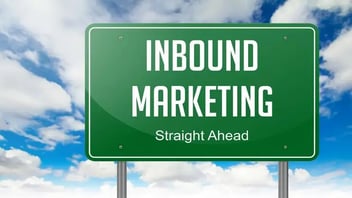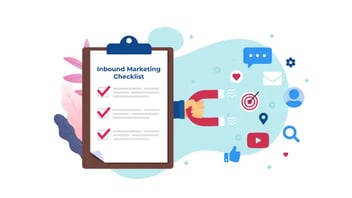Elevate your content with HubSpot Marketing Hub for content marketing. Discover how our strategies and HubSpot's tools drive success.
How Effective Content Marketing Drives Sales and Business Growth
Online marketing has undergone both massive growth and radical change in recent years. The explosion of eCommerce and the infrastructure to support ubiquitous high-speed internet connections have changed the face of business worldwide. As a result, many marketing departments and agencies are scrambling to get ahead of the next shakeup, expanding offerings and modifying existing practices to stay relevant to current customers and continue attracting new ones.

Content marketing is one of the techniques we're excited to see catching on like wildfire among marketers. As a critical component of the broader inbound marketing, it is exciting because it signals a shift toward a customer-first attitude among companies and marketers alike that is changing the overall relationship from pushy sales attempts to creating pull for your products and services.
Why Content Marketing Matters
-
Content marketing generates over three times as many leads as outbound marketing and costs 62% less. Content marketing is more efficient than traditional outbound marketing techniques like cold calling and email marketing. It generates three times as many leads, making it a highly effective approach to lead generation.
-
B2B content marketers who use gated content see a 50% increase in leads. By offering gated content, which is accessible only to those who provide their contact details, businesses can effectively generate leads. This strategy incentivizes potential customers to share their information in exchange for valuable content, ultimately increasing the likelihood of conversion.
-
More than 80% of B2C marketers say content marketing has helped them increase website traffic. By crafting valuable and pertinent content that resonates with your ideal audience, content marketing can draw new visitors to your site, piquing their interest and prompting them to explore your business further.
-
63% of B2B buyers say content marketing has influenced their purchase decisions. By offering potential customers valuable information through content marketing, you can establish yourself as an industry expert and increase the likelihood of them choosing your product or service over competitors. This powerful approach can effectively influence purchase decisions and boost your sales.
-
Content marketing can increase customer lifetime value by up to 70%. Content marketing can be a valuable tool in increasing customer lifetime value by cultivating strong relationships with both potential and existing customers. By providing valuable and relevant content, businesses can encourage repeat business and establish brand loyalty over time. Ultimately, this can lead to a greater lifetime value for each customer, resulting in long-term success for the business.
You Might Also Like This Post:
We look at how this growth in Content Marketing is helping companies drive sales in both B2C and B2B scenarios, with B2B content marketing growing as rapidly as B2C content marketing, if not faster.
What is Content Marketing?
The Content Marketing Institute offers the following definition:
Content marketing is a strategic marketing approach focused on creating and distributing valuable, relevant, and consistent content to attract and retain a clearly defined audience — and, ultimately, to drive profitable customer action.
We added the emphasis on that last bit because that's really what we're here to discuss: how effective Content Marketing can drive profitable customer actions, aka sales. And just how does that happen? There are several primary ways content marketers can give a powerful assist to your sales efforts:
-
By driving demand for your services via generating brand buzz among your existing customer base.
-
Content Marketing encourages trust in your audience, so they'll reach out to you when ready to take the next step.
-
And it shows your existing and potential customers that you're willing to give away your best stuff for free.
We'll look at each of these in more depth shortly. We will look at how this works in both a B2B marketing strategy and B2C scenarios, followed by a brief rundown of some general CM best practices, no matter your situation.
Content Marketing for B2B
The B2B marketing world is due for a refresh, and content marketing is here to provide it. By providing informative and educational blog posts, ebooks, and whitepapers to your audience, they will view you and your company as a leader in your sector. This content is the currency for B2B marketing, and many people will gladly exchange their contact information.
Then, when they've read their fill of your knowledgeable insight into their pain points, they'll be ready to convert to paying customers and get in touch. The trust you build by giving away that insight or in exchange for that contact information rather than money will convince your audience that you are the right company to help solve their more significant problems. When that time comes, who do you think they'll turn to?
Content marketing is really like a first date. If all you do is talk about yourself, there won't be a second one.
- David Beebe
B2C is Still Ripe for Content Marketing Innovation
When we said "content marketing," admit it, you thought of direct sales or other B2C uses, didn't you? We don't blame you; most companies with social media presence or blogs are directing their content at their target buyers. Social media is perhaps the most significant segment of this market. The content draws eyes to corporate eCommerce pages where additional content drives those visitors to convert to customers.
And this is an excellent use for CM, as long as that's the goal for your content marketing strategy. Especially for direct-to-consumer sales, a solid social media presence is pretty much required these days.
Content Marketing Best Practices for Driving B2B Sales
Our main subject today is driving sales via a solid content marketing strategy. Here are some best practices with proven track records, especially in marketing B2B products and services.
-
Set goals. Specifically, use the SMART rubric to establish and document a sound strategy so your team is on the same page with concrete goals. SMART stands for Specific, Measurable, Attainable, Relevant, and Time-bound. Using this outline, you can ensure all goals are clear, concise, and actionable, not to mention in line with your company's overall sales goals.
-
Create a Content Marketing strategy. CMI research shows that while 91% of marketers use CM, only ~37% have a documented strategy. While we feel that content marketing is better than none to impact your B2B sales, it pays to have a robust strategy.
-
Deliver content that delights your audience. You know your audience better than we do, so use that to your advantage when laying out that strategy. If you provide a service to businesses in one sector, use your content to demonstrate your mastery of that sector. Define your buyer personas and show your readers how you understand their pain points in every stage of the buyer's journey, then demonstrate how your services can help them overcome those problems.
-
Remember that content marketing is a long game. You likely won't see results from your content efforts in the first few months. It may take six months to see your first conversion, but the organic conversions will keep coming in once that happens.
Five specific tips for B2B Content Marketing
-
Find keywords with search traffic and business potential: Conduct keyword research to identify topics that potential customers are searching for. If you're a software company, you might target keywords like "project management software" or "CRM software."
Example: Slack targets keywords like "team collaboration" and "remote work tools."
-
Produce informative and insightful content: Create content that educates and informs potential customers about your products or services. A financial services company might create content that explains complex financial concepts in simple terms.
Example: HubSpot, which provides a wealth of educational content on topics like inbound marketing and sales.
-
Use storytelling to engage your audience: Incorporate storytelling into your content to make it more engaging and memorable. A technology company might tell how one of its clients successfully implemented its software.
Example: Salesforce, which uses customer success stories to showcase the benefits of its CRM software.
-
Utilize different content formats: Experiment with different types of content to see what resonates with your audience. A marketing agency might create blog posts, infographics, and videos to reach different segments of its audience.
Example: LinkedIn, which offers a variety of content formats like articles, videos, and podcasts.
-
Focus on quality over quantity: Don't produce content just to produce content. Instead, focus on creating high-quality content that provides value to your audience. A software company might create in-depth whitepapers or case studies that showcase the benefits of their products.
Example: CB Insights, which produces an entertaining and informative weekly newsletter.
By cultivating happy customers through content marketing, you can tap into the power of word-of-mouth marketing. Satisfied customers will spread the word about how amazing your services are and how you worked wonders on their pain points. This organic growth is a sustainable way to build a solid customer base without resorting to pushy sales tactics, making it the best way to drive sales in B2B.
This content is also available in:
- German: Wie effektives Content-Marketing Umsatz und Geschäftswachstum steigert
- Spanish: Cómo el marketing de contenidos eficaz impulsa las ventas
- French: Comment un marketing de contenu stimule les ventes et la croissance
- Italian: Come un marketing dei contenuti stimola le vendite e la crescita
- Romanian: Cum marketingul de conținut eficient crește vânzările și afacerea
- Chinese: 有效的内容营销如何推动销售和业务增长










Leave a Comment